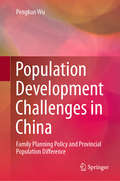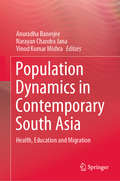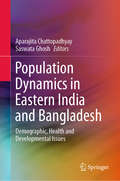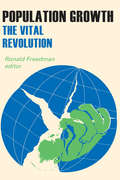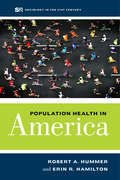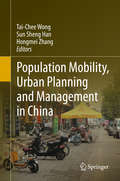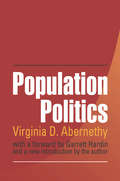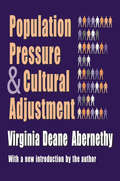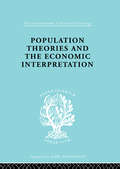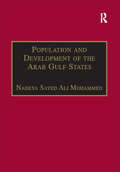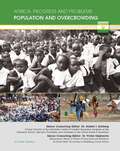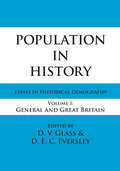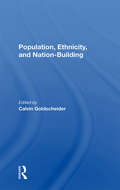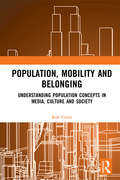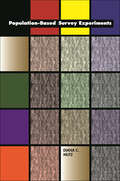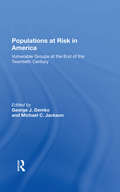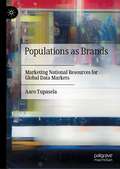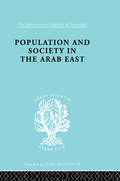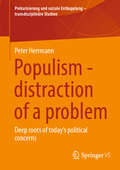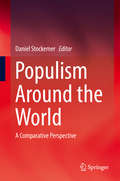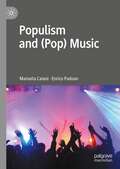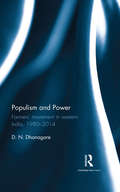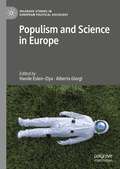- Table View
- List View
Population Development Challenges in China: Family Planning Policy and Provincial Population Difference
by Pengkun WuThis book explores the population development challenges in China. It started by analyzing two of the major challenges: designing a suitable family planning policy and dealing with the serious provincial population difference. It then proposes effective measures to address these challenges by adopting various quantitative methods, such as system dynamics, nonlinear programming and spatial econometrics in evaluating the effects of different policy scenarios, which made the results more scientific and reliable, thus the final policy suggestions effective and evidence based. The book includes a number of mathematical models and is suitable for graduate students and researchers in population modeling and relevant research areas.
Population Dynamics in Contemporary South Asia: Health, Education and Migration
by Anuradha Banerjee Vinod Kumar Mishra Narayan Chandra JanaThis book discusses the sequential development of population research in India, focusing on contemporary issues like demography, population studies, geography, sociology, urban studies and many more. It describes the problems related to the underdeveloped regions in India, Nepal and Bangladesh and includes tabular representations of the analyzed data as well as visual representations/illustrations in the form of graphs and maps. Further, it features fascinating case studies on primary field-research experiences. Presenting interdisciplinary contributions, the book is divided into four sections: the first part examines social issues related to health, while the second explores social sustainability, lifestyles, and cultural aspects. The third and fourth sections address migration and quality of life, respectively. The book is of interest to students studying demography, as well as researchers and policymakers in the fields of population studies, geography and sociology.
Population Dynamics in Eastern India and Bangladesh: Demographic, Health and Developmental Issues
by Aparajita Chattopadhyay Saswata GhoshThis book highlights historical and current perspectives on population issues in the Bengali-speaking states of India (i.e., West Bengal, Tripura, Assam) and Bangladesh and explores three core population dynamics: fertility, mortality–morbidity and development. Furthermore, it presents a selection of revealing cases from area-specific micro-studies, mainly conducted in West Bengal and Bangladesh. The book covers various demographic and health issues in these two regions, which are similar in terms of several sociocultural aspects, yet dissimilar in terms of their policies and programs. Adopting an integrated approach that combines various disciplines and perspectives, it explores highly topical issues such as social inequality, religious difference and mental health. The book is intended for a broad readership interested in population studies, sociology and development, including academics, researchers, planners and policymakers.
Population Growth: The Vital Revolution
by Ronald FreedmanThe population of the modern world continues to grow at a rate unprecedented in human history. How are we to explain this massive increase in the number of living people? What is its consequence, now and for the future? How have populations changed in size and structure since the advent of industrial technology? Can we predict the population trends in developing countries? These and many other significant questions are dealt with in a persuasive yet accessible manner in Ronald Freedman's pivotal "Population Growth".Modern population trends are unique in historical perspective; describing them as part of a "vital revolution" is not an exaggeration. The more popular term "population explosion" is less accurate because it refers to only one aspect of the current situation - the unprecedented growth rates. In the last two centuries other important trends have developed, also without precedent in all of the previous millennia of human history. While the size of population growth is very important in itself, the essays in this volume demonstrate that many other aspects of structure and change in populations are equally important.In readable, non-technical language, these collected essays analyze the most important modern trends in world population. The essays include comprehensive discussions of population theory, analyses of population trends, and prospects in the United States and surveys of population trends in other major areas of the world. As a survey of current population problems, this book will be a library staple for those involved in international development programs, sociologists, family planning workers, and everyone concerned with the contemporary vital revolution in population.
Population Health in America (Sociology in the Twenty-First Century #5)
by Robert A. Hummer Erin R. HamiltonIn this engaging and accessibly written book, Population Health in America weaves demographic data with social theory and research to help students understand health patterns and trends in the U.S. population. While life expectancy was estimated to be just 37 years in the United States in 1870, today it is more than twice as long, at over 78 years. Yet today, life expectancy in the U.S. lags behind almost all other wealthy countries. Within the U.S., there are substantial social inequalities in health and mortality: women live longer but less healthier lives than men; African Americans and Native Americans live far shorter lives than Asian Americans and White Americans; and socioeconomic inequalities in health have been widening over the past 20 years. What accounts for these population health patterns and trends? Inviting students to delve into population health trends and disparities, demographers Robert Hummer and Erin Hamilton provide an easily understandable historical and contemporary portrait of U.S. population health. Perfect for courses such as population health, medical or health sociology, social epidemiology, health disparities, demography, and others, as well as for academic researchers and lay persons interested in better understanding the overall health of the country, Population Health in America also challenges students, academics, and the public to understand current health policy priorities and to ask whether considerably different directions are needed.
Population Mobility, Urban Planning and Management in China
by Tai-Chee Wong Sun Sheng Han Hongmei ZhangThis volume contains essays that examine contemporary urban and regional planning and development in China. Through in-depth theoretical and empirical analysis, it provides insights into the urban policies and operational mechanisms of this colossal transitional economy which has presented unprecedented challenges and dynamics. Inside, readers will discover the causes and consequences of rapid urbanization that have led to a series of environmental, economic and social planning and management measures designed to achieve quality urban living. The essays also detail efforts in adopting the latest options in city building such as specific urban planning approaches in developing large city regions, building cities without slums, constructing new townships and green urbanism, including eco-city and sustainable transport. In addition, coverage explores financial management and support as a means to encourage urbanization and urban economic growth in less-developed regions. Overall, the volume offers a wealth of concrete, detailed information on conditions in different regions of China and features an extensive range of content, methods and theory. It provides readers with a comprehensive portrait of the chain relationship between rapid urbanization, spatial planning and management throughout the country. The book will serve as a useful reference for national and international consultancy services doing business or serving public interest in China. It will also be of interest to an international audience seeking a better understanding of urban development and planning in China, including university teachers, students, government agencies and general readers.
Population Politics: The Choices That Shape Our Future
by Virginia Abernethy Garrett HardinInternational efforts to regulate fertility rates so that populations do not grow beyond the earth's capacity have included technical assistance and capital; improved health care conditions to lower the risk of infant mortality; increased opportunities to develop literacy; the democratization of governments; and several decades of liberal immigration and refugee policies favoring third world nations. The persistence of high fertility despite international efforts confounds demographers. 'Population Politics' brilliantly dissects the paradigm responsible for the counterproductive efforts of nations and international agencies. Abernethy, a renowned anthropologist, shows why policies hamper the shift to lower fertility. Ireland, Indonesia, Cuba, China, Turkey and Egypt are but a few of the countries Abernethy examines, showing how economic, sociocultural, and agricultural factors that have caused population growth can be harnessed to stabilize population size. 'Population Politics' is a provocative examination of the influence of aid and liberal immigration policies on world population growth, and often counterproductive to the role of the United States as an industrial power. This volume's uniquely interdisciplinary perspective will enlighten the lay reader, as well as demographers and epidemiologists, conservationists, reproduction and family specialists, agricultural economists, and public health personnel. Virginia D. Abernethy is professor emeritus of psychiatry (anthropology) at Vanderbilt Medical School and was for 11 years the editor of the scholarly journal 'Population and Environment. Garrett Hardin is emeritus professor of human ecology in the Department of Biological Sciences and the University of California, Santa Barbara.
Population Pressure and Cultural Adjustment
by Virginia Deane AbernethyIntegrating research from anthropology, biology, and history, this provocative, brilliant book proposes a theory of demographic equilibrium. The author's hypothesis is that human beings, like many other species, are able to adjust their population numbers to the carrying capacity of the environment. Abernethy points out that in response to perception of scarcity or abundance of resources, culturally mediated values, beliefs and behavioral patterns are modified in ways that can either raise or lower rates of population growth. Abernethy in this way moves beyond the ideological debates that have sundered the field of policy and population. In real world time and space, cultural adjustments that balance population and resources are made over a long stretch in relatively stable or known environments. These adjustments also operate in processes that involve technological advances that appear to increase carrying capacity, and these usually act to support and underwrite population growth in any given area. In her new introduction to this first paperback edition, Abernethy shows how many of the cultural changes the book predicted in 1979 have come to pass. She details a complex of behaviors that favor single life-styles or small family size that have contributed to low fertility rates among native-born Americans while fertility rates among immigrants continue to climb. Population Pressure and Cultural Adjustment is not simply a theoretical slogan, but discusses a rich set of different cultural situations where this homeostatic process has been disrupted or aborted. Often, disruption occurs after the infusion of foreign value systems as well as new forms of technological innovation, or when highly permeable social boundaries result in the importation of resources for which the limits and consequences are not fully appreciated by the host population. This work will inevitably be controversial because of its implications for the limits as well as the potential of public policy in both advanced and underdeveloped societies.
Population Theories and their Economic Interpretation (International Library of Sociology)
by Sydney H. CoontzFirst published in 1998. Routledge is an imprint of Taylor & Francis, an informa company.
Population and Development of the Arab Gulf States: The Case of Bahrain, Oman and Kuwait
by Nadeya Sayed MohammedThis thought-provoking study measures and critically examines the effects that an average population growth rate of 2.8% could have on the development of the Arab Gulf States. It questions the ability of Gulf governments to continue providing relatively high standards of education, health and employment under conditions of rapid population growth, an undiversified economic base, and a tribal political framework.  Within this context, population growth is identified as one important variable that hinders long-term development. The book will appeal to all those interested in the Middle East, demography, development and sociology.
Population and Overcrowding (Africa: Progress and Problems)
by Tunde ObadinaAfrica is the worlds poorest continent, and it also has the worlds fastest-growing population. Many observers have concluded that overpopulation is a root cause of Africas poverty, and that if the continent is ever to emerge from underdevelopment its rapid population growth will have to be slowed. This book examines those assertions, offering a wealth of statistical and other evidence to suggest that the link between African poverty and the size of Africas population is by no means definitive. The book also examines the important demographic trendssuch as rapid urbanization, elevated mortality rates from the HIV/AIDS epidemic, and continued high fertilitythat will help shape African societies in the decades to come.
Population and Society
by Jr. Poston Dudley L. Bouvier Leon F.Population and Society: An Introduction to Demography is an ideal text for undergraduate, as well as graduate, students taking their first course in demography. It is sociologically oriented, although economics, political science, geography, history, and the other social sciences are also used to inform the materials. Although the emphasis is on demography, the book recognizes that, at the individual level, population change is related to private decisions, especially in relation to fertility, but also to mortality and migration. The text thus considers in some detail the role of individuals in population decision making. At the level of countries, and even the world, changes in population size have an important effect on the environmental and related challenges facing all of the world's inhabitants. Therefore, attention is paid to the broad implications of population growth and change.
Population in History: Essays in Historical Demography, Volume I: General and Great Britain
by D. V. Glass D. E. C. EversleyThis large-scale comparative endeavor, complete in two volumes, reflects increasing concern with the population factor in economic and social change worldwide. Demographers, on their side, have been focusing on history. In response to this, Population in History represents the work of two practitioners that have begun to work together, using their combined approaches in an attempt to assess and account for population growth experienced by the West since the seventeenth century.There is a long record of interest in the history of population. But the interest now displayed is likely to be both more persistent and far more fruitful in its consequences. New studies have been initiated in many countries. And because the studies are more informed and systematic than many of those of earlier periods, they are already provoking the further spread of research. A much more positive part is now also being played by national and international associations of historians and demographers. It is not unlikely that, within the next fifteen or twenty years, the main outlines of population change in the seventeenth and eighteenth centuries will be firmly established for much of Europe.Previous research has tended to appear in specialist journals and academic publications. This volume is intended to provide a more easily accessible publication. It has been thought appropriate to include some earlier work, both because of its intrinsic interest and because it provided the background and part of the stimulus to the later research. Of the twenty-seven contributions to this outstanding volume, seven are unabridged reprints of earlier work; the remaining contributions are either entirely new or represent substantial revisions of work published elsewhere.
Population in History: Essays in Historical Demography, Volume II: Europe and United States
by Hugh DaunceyThis large-scale comparative endeavor, complete in two volumes, reflects increasing concern with the population factor in economic and social change worldwide. Demographers, on their side, have been focusing on history. In response to this, Population in History represents the work of two practitioners that have begun to work together, using their combined approaches in an attempt to assess and account for population growth experienced by the West since the seventeenth century.There is a long record of interest in the history of population. But the interest now displayed is likely to be both more persistent and far more fruitful in its consequences. New studies have been initiated in many countries. And because the studies are more informed and systematic than many of those of earlier periods, they are already provoking the further spread of research. A much more positive part is now also being played by national and international associations of historians and demographers. It is not unlikely that, within the next fifteen or twenty years, the main outlines of population change in the seventeenth and eighteenth centuries will be firmly established for much of Europe.Previous research has tended to appear in specialist journals and academic publications. This volume is intended to provide a more easily accessible publication. It has been thought appropriate to include some earlier work, both because of its intrinsic interest and because it provided the background and part of the stimulus to the later research. Of the twenty-seven contributions to this outstanding volume, seven are unabridged reprints of earlier work; the remaining contributions are either entirely new or represent substantial revisions of work published elsewhere.
Population, Ethnicity, And Nation-building
by Calvin GoldscheiderThis volume focuses on the linkages between ethnicity and population processes in the context of nation-building. Using historical and contemporary illustrations in a variety of countries, parts of this complex puzzle are scrutinized through the prisms of sociology, history, political science, anthropology, and demography Themes of ethnic group formation and transformation, persistence and assimilation, demographic transitions and convergences, and the processes of political mobilization and economic development are described and compared. Case studies from Southeast Asia, China, Africa, Brazil, Israel, the former Soviet Union, Canada, Europe, and the United States are presented by leading scholars. The examples illustrate the diversity of contexts that connect population, ethnicity, and nation-building, raising new questions and comparative problems. The importance of ethnic conflict for issues of inequality and group disadvantage in the emerging societies of Asia, Africa, and the Middle East; in the politics of race and immigration in western societies; and in European and American history emerges from the research. The multidisciplinary emphasis addresses core themes of ethnicity and nation-building in comparative perspectives.
Population, Mobility and Belonging: Understanding Population Concepts in Media, Culture and Society
by Rob CoverIn a world of increasing mobility and migration, population size and composition come under persistent scrutiny across public policy, public debate, and film and television. Drawing on media, cultural and social theory approaches, this book takes a fresh look at the concept of ‘population’ as a term that circulates outside the traditional disciplinary areas of demography, governance and statistics—a term that gives coherence to notions such as community, nation, the world and global humanity itself. It focuses on understanding how the concept of population governs ways of thinking about our own identities and forms of belonging at local, national and international levels; on the manner in which television genres fixate on depictions of overpopulation and underpopulation; on the emergence of questions of ethics of belonging and migration in relation to cities; on attitudes towards otherness; and on the use by an emergent ‘alt-right’ politics of population in ‘forgotten people’ concepts. As such, it will appeal to scholars of sociology, geography and media and cultural studies with interests in questions of belonging, citizenship and population.
Population-Based Survey Experiments
by Diana C. MutzPopulation-based survey experiments have become an invaluable tool for social scientists struggling to generalize laboratory-based results, and for survey researchers besieged by uncertainties about causality. Thanks to technological advances in recent years, experiments can now be administered to random samples of the population to which a theory applies. Yet until now, there was no self-contained resource for social scientists seeking a concise and accessible overview of this methodology, its strengths and weaknesses, and the unique challenges it poses for implementation and analysis.Drawing on examples from across the social sciences, this book covers everything you need to know to plan, implement, and analyze the results of population-based survey experiments. But it is more than just a "how to" manual. This lively book challenges conventional wisdom about internal and external validity, showing why strong causal claims need not come at the expense of external validity, and how it is now possible to execute experiments remotely using large-scale population samples.Designed for social scientists across the disciplines, Population-Based Survey Experiments provides the first complete introduction to this methodology.Offers the most comprehensive treatment of the subjectFeatures a wealth of examples and practical adviceReexamines issues of internal and external validityCan be used in conjunction with downloadable data from ExperimentCentral.org for design and analysis exercises in the classroom
Populations At Risk In America: Vulnerable Groups At The End Of The Twentieth Century
by George J Demko Michael C. JacksonAs this century draws to a close and the new one approaches, the United States is still struggling with serious and persistent social problems. These troubling dilemmas, including poverty, homelessness, discrimination, and severe inequity, afflict some subgroups of the population more than others, and it is the plight of these at-risk groups—childr
Populations as Brands: Marketing National Resources for Global Data Markets
by Aaro TupaselaIn Populations as Brands Aaro Tupasela extends the fields of critical data studies and nation branding into the realm of state controlled biobanking and healthcare data. Using examples from two Nordic countries - Denmark and Finland – he explores how these countries have begun to market and brand their resources using methods and practices drawn from the commercial sector. Tupasela identifies changes during the past ten years that suggest that state collected and maintained resources have become the object of valuation practices. Tupasela argues that this phenomenon constitutes a novel form of nation branding in which relations between the states, individuals and the private sector are re-aligned. The author locates the historical underpinnings of population branding in the field of medical genetics starting in the early 1960s but transforming significantly during the 2010s into a professional marketing activity undertaken at multiple levels and sites. In studying this recent phenomenon, Tupasela provides examples of how marketing material has become increasingly professional and targeted towards a broader audience, including the public. The book will be of particular interest to scholars of critical data studies and nation branding, as well as students of science and technology studies, sociology and marketing.
Populatn Soc Arab East Ils 68 (International Library of Sociology #16)
by Gabriel BaerFirst published in 1998. Routledge is an imprint of Taylor & Francis, an informa company.
Populism - distraction of a problem: Deep roots of today's political concerns (Prekarisierung und soziale Entkopplung – transdisziplinäre Studien)
by Peter HerrmannThis book questions the mainstream interpretation of the current political shifts as a move to ultra-conservative and even fascist politics, changing the polities of the Western democracies that can be overcome by “reclaiming democracy”. Instead of following this path, the present work analyses these developments as extreme consequence that emerged from the individualist and short-sighted understanding of rationality that coined the enlightenment and had been translated into an institutionalist take on democracy. Such view, while accepting the common interpretation of a dramatic and extremely dangerous development, goes further: it emphasises the need to question the pathway of modernisation: Looking at what is hidden by the eclipse of reason encourages also to look for a new societal model, asking for a real public, transcending current strives for publicity. As such, it is an important contribution to debates on precarity and a one-sided understanding of Human Rights. Scholars of political science and political philosophy will be interested in the work as it will be of interest for those who are engaging in oingoi8ng political debates.
Populism Around the World: A Comparative Perspective
by Daniel StockemerThis book provides a global overview of populist actors and strategies around the globe from a comparative perspective. By presenting six country studies on the United States, France, Poland, Turkey, the Philippines and Argentina, the contributors analyze how parties from both the radical left and right use a populist discourse combining people-centrism, anti-elitism, and the exclusion of certain population cohorts from the national community. They illustrate how populist actors mobilize and persuade citizens by using simple and slogan-based language and charismatic leadership while offering simple solutions to complex problems.Each case study describes the history of populism in the respective country, current populist actors, the strategies these parties and movements employ, and how successful these tactics are within the population. These case studies are embedded within two theoretical chapters that link the cases to the theoretical and empirical literature on populism. This timely book will appeal to anyone interested in understanding the current enormous appeal of populist movements around the globe.
Populism and (Palgrave Studies in European Political Sociology)
by Manuela Caiani Enrico PadoanThis book launches a proposal: to fill some empirical and theoretical gaps that presently exists in populism studies by looking at the potential nexus between populist phenomena and popular culture. It provides a detailed account of the multiple mechanisms linking the production of pop music (as a form of popular culture) to the rise and reproduction of populism. The authors use a case study of Italy to interrogate these mechanisms because of its long-lasting populist phenomena and the contextual importance of pop music. The book’s mixed-methods strategy assesses three different aspects of the potential relationship between pop music and populist politics: the cultural opportunity structure generated and reproduced by the production of music, the strategies political actors use to exploit music for political purposes, and, crucially, the ways fans and ordinary citizens understand the relationship between pop music and politics, and subsequent debates and identities. Moving from the case study, the book in its last chapter offers a more general understanding of the associations between pop music and populism.
Populism and Power: Farmers’ movement in western India, 1980--2014
by D. N. DhanagareThis book traces the entire trajectory of the farmers’ movement in Western India, especially Maharashtra, from the 1980s to the present day. It reveals the fundamental contradictions between populism as an ideology and as political power within the democratic state structure. The volume highlights the ideologies of the movement; its emergence in the wake of a perceived agrarian crisis; how it conflates economics and populism; the role of leadership; stages of development from grassroots agitations rooted in civil society to the attempts to create space within structures of democratic politics; the eventual formation of a separate political party and consequent implications. It maps the linkages between populist ideology and mass participation, and their contested successes and failures in the domain of electoral politics. Further, the author underlines the effectiveness of the movement in addressing class and gender equations in the region. <P><P>Rich in primary archival sources and informed field studies, this book will interest scholars and researchers of agrarian economy, rural sociology, and politics, particularly those concerned with social movements in India.
Populism and Science in Europe (Palgrave Studies in European Political Sociology)
by Hande Eslen-Ziya Alberta GiorgiThis book provides the first systematic and comparative analysis of the intersections of populism and science in Europe, from the perspective of political sociology.Populism is the object of rich scholarly debate over its definition and the best way to approach its study. But until now, little attention has been paid to the relationships between populism and science. Recently, the Covid-19 crisis has exposed the contradictions in this relationship, and this book combines an analysis of the theoretical aspects of the relationship between populism and science with rigorous empirical research.The theoretical perspectives show populism as a thin-ideology, as discourse and performance, and as a political logic, consider both right-wing and left-wing populism, and focus on leaders as well as citizens. The book also offers an overview of controversies within different fields of ‘science’, including case studies on food science, climate change, vaccination, gender theory, COVID-19, and environmental issues.The book will be of interest to scholars and students of a number of social science disciplines, including political sociology, political science and political psychology.
